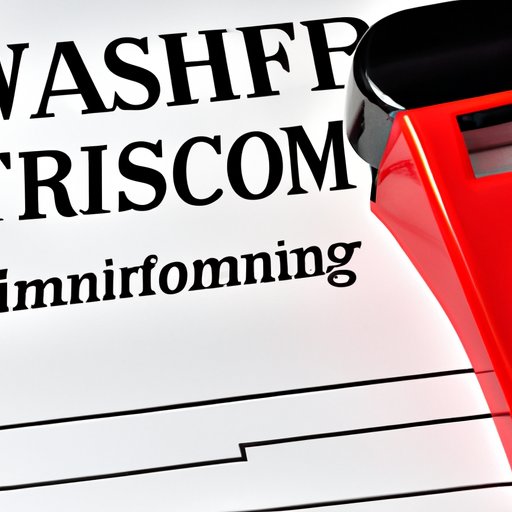
Introduction
Reporting someone to the IRS is a serious matter that can have significant consequences for both the individual being reported and the person reporting the activity. However, reporting fraudulent activity is important to help ensure the fairness of the tax system and prevent tax evasion. In this article, we’ll explore the ins and outs of reporting someone to the IRS, how it can affect you and your finances, what the IRS does to investigate tax evasion and fraud, and what happens when you blow the whistle on tax cheats.

The Ins and Outs of Reporting Someone to the IRS: What to Expect
Anyone can report someone to the IRS if they suspect tax fraud or other illegal activity. However, it’s important to note that the IRS receives millions of reports each year, and not all of them result in an investigation or penalties for the targeted individual.
To report someone to the IRS, you can use Form 3949-A, which is available on the IRS website. You can also call the IRS at 1-800-829-1040 and report fraudulent activity over the phone. When making your report, it’s important to provide as much information as possible, including the individual’s name, address, and other identifying information, as well as a description of the fraudulent activity.
Once the IRS receives a report, they will investigate the claim to determine if there is evidence of tax fraud or illegal activity. The investigation process may involve reviewing bank statements, tax returns, and other financial records to gather evidence. If the IRS finds evidence of illegal activity, they may pursue criminal charges or impose civil penalties on the individual.
How Reporting Someone to the IRS Can Affect You and Your Finances
Reporting someone to the IRS can have consequences for the person making the report, as well as the individual being reported. For the individual making the report, there may be personal and professional consequences if the report is made public. Some whistleblowers have faced retaliation from their employers or colleagues, including termination or harassment.
It’s important to protect yourself from retaliation by making a protected disclosure. The IRS offers protections for whistleblowers under the Whistleblower Protection Act, which prevents employers from retaliating against employees who report illegal activity. To make a protected disclosure, it’s important to follow the proper procedures and provide as much information as possible to the IRS.
For the person being reported, the consequences of an IRS investigation can be severe. If the IRS finds evidence of tax fraud or other illegal activity, they may impose significant fines and penalties, including interest and fees. In some cases, criminal charges may also be pursued, which can result in fines, probation, or even jail time.
The Role of the IRS in Investigating Tax Evasion and Fraud
The IRS is responsible for investigating tax evasion and fraud to ensure that everyone pays their fair share of taxes. The IRS has broad investigative powers, including the ability to subpoena financial records, interview witnesses, and conduct undercover operations.
When investigating tax fraud, the IRS looks for patterns of behavior that indicate intentional evasion of taxes. This may include concealing income, overstating deductions, or failing to report all income on tax returns. Once the IRS has identified potential fraud, they will conduct a thorough investigation to gather evidence and determine the extent of the fraud.
If the IRS finds evidence of tax fraud, they may impose civil or criminal penalties on the individual. Civil penalties may include fines and interest, while criminal penalties may result in fines, probation, or even jail time.
What Happens When You Blow the Whistle on Tax Cheats
Whistleblowers who report tax fraud may be eligible for rewards under the IRS Whistleblower Program. The program offers rewards of up to 30% of the total amount the IRS collects in back taxes, penalties, and interest as a result of the whistleblower’s report.
To qualify for a reward, the whistleblower must provide original information that leads to the collection of taxes, penalties, or interest totaling more than $2 million. The whistleblower must also provide the information voluntarily and not as part of their job duties.
There have been many successful whistleblower cases in recent years, resulting in billions of dollars in recovered funds for the IRS. Some of the largest awards have been given to whistleblowers who reported fraud by large corporations or wealthy individuals.
Protecting Your Rights When Reporting Someone to the IRS
Whistleblowers are protected by law from retaliation under the Whistleblower Protection Act. This act prohibits employers from retaliating against employees who report fraudulent activity to the government.
Under the act, whistleblowers may make protected disclosures of information to a supervisor, a regulatory agency, Congress, or any other authorized party without fear of retaliation from their employer. If retaliation does occur, the whistleblower may be entitled to legal remedies, including reinstatement, back pay, and compensatory damages.
The Consequences of Ignoring Fraudulent Activity on Your Tax Return: Why Reporting is Important
Reporting fraudulent activity on your tax return is critical to the integrity of the tax system. When individuals evade taxes or commit tax fraud, they shift the tax burden onto other taxpayers, resulting in higher tax rates for everyone.
In addition to affecting the tax system, failing to report fraudulent activity on your tax return can have serious consequences for the individual. If the IRS discovers fraudulent activity on a tax return, they may impose significant fines and penalties, including interest and fees. In some cases, criminal charges may also be pursued, which can result in fines, probation, or even jail time.
By reporting fraudulent activity to the IRS, you can help prevent tax fraud and ensure that everyone pays their fair share of taxes. Reporting may also result in rewards under the IRS Whistleblower Program, which can provide a financial incentive to blow the whistle on tax cheats.
Conclusion
Reporting someone to the IRS is a serious matter that can have significant consequences for both the individual being reported and the person making the report. However, reporting fraudulent activity is important to ensure the fairness of the tax system and prevent tax evasion. By following the proper procedures and protecting yourself from retaliation, you can help ensure that tax cheats are held accountable and everyone pays their fair share of taxes.
If you are considering reporting someone to the IRS, it’s important to seek professional advice from a tax attorney or other qualified expert to ensure that you understand the potential risks and benefits of your decision.
Remember, the IRS Whistleblower Program offers rewards for successful reports of tax fraud, so blowing the whistle on tax cheats can also be financially rewarding.





